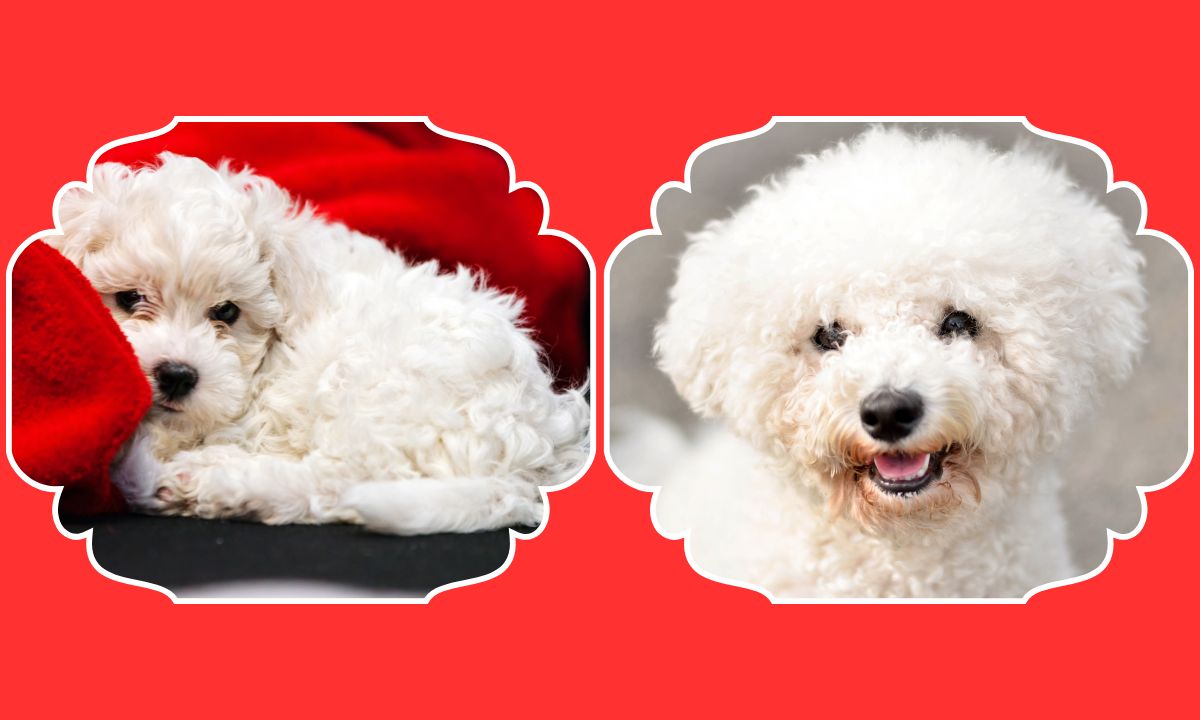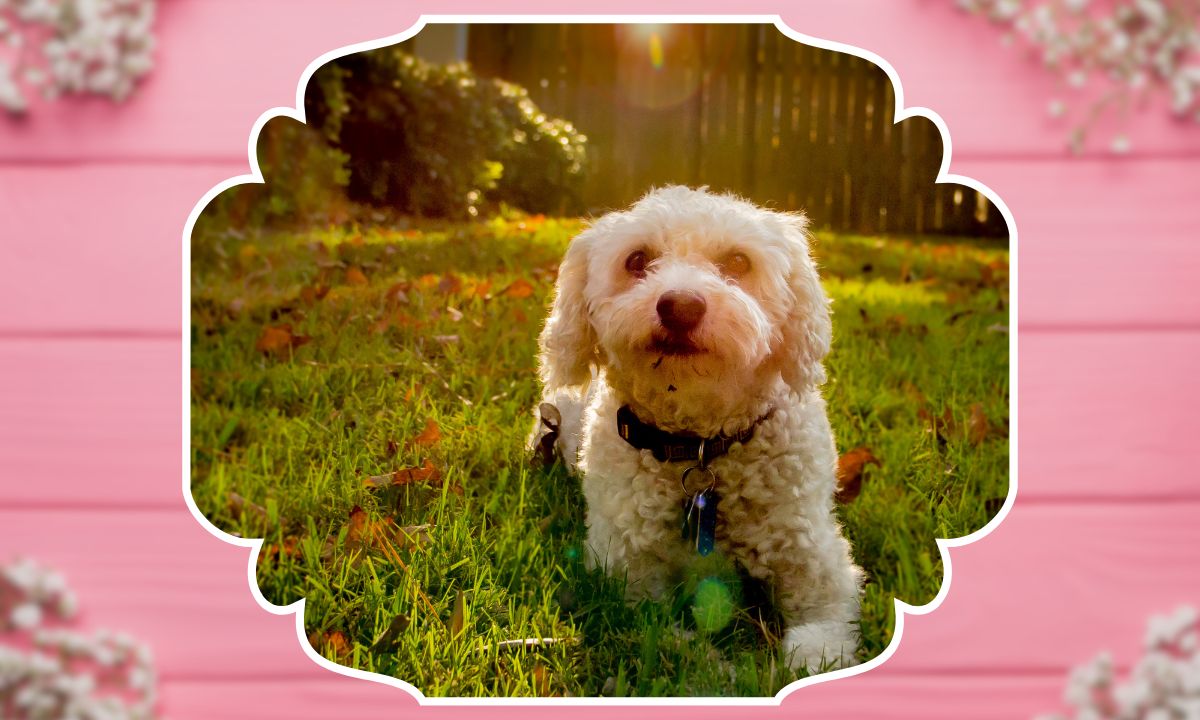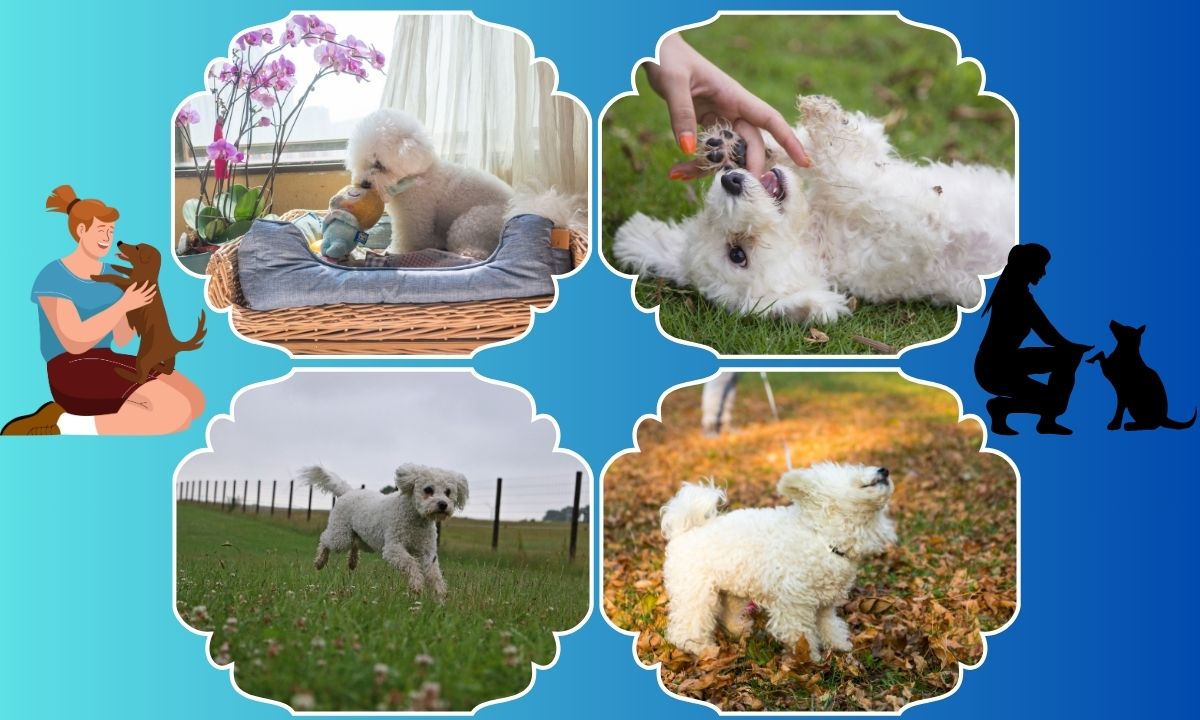The Bichon Poodle, sometimes referred to as the Poochon or Bichon Poo, is a cute, tiny dog breed that steals hearts with its lively demeanor and cute appearance. The best qualities from both of its parents are inherited by this designer dog, which is a cross between a Bichon Frise and a Poodle.
The Bichon Poodle may be the ideal pet for you if you’re searching for a smart, active, and affectionate companion that enjoys socializing with people. We’ll go into more detail about what you need to know about this wonderful breed in this guide.

Bichon Poodle: Quick Summary
- Height: 9 to 15 inches
- Weight: Typically 6 to 17 pounds
- Lifespan: 12 to 15 years
- Coat: Soft, curly, hypoallergenic
- Color Varieties: Cream, tan, apricot, brown, or white
- Temperament: Intelligent, affectionate, playful, and friendly
- Energy Level: Moderate to high
- Exercise Needs: Daily walks and playtime
- Ideal For: Families, singles, seniors, and those with allergies (due to hypoallergenic coat)
Bichon Poodle: History And Origin

The Bichon Poodle is not a historically recognized breed in and of itself; rather, we must examine its parent breeds, the Bichon Frise and the Poodle, in order to comprehend its origins.
Bichon Frise: With a lengthy history, this cuddly charmer is most likely descended from Mediterranean water dog breeds. From the thirteenth century onward, they enjoyed great popularity among European aristocracy and mariners, especially in Spain, Italy, and France.
Poodle: Don’t let their stylish haircuts deceive you! Poodles were first developed as working water dogs for hunting ducks in Germany. They soon found themselves among the French nobility, where their athleticism and intelligence made them valued friends.
Although the precise beginnings of Bichon Poodle breeding remain unknown, in the second part of the 20th century, designer dogs such as these gained popularity. Bichon Poodles are an excellent example of how breeders have attempted to blend the desirable qualities of various breeds. It combines the intelligence and athleticism of the Poodle with the hypoallergenic coat and amiable disposition of the Bichon Frise.
Bichon Poodle Physical Appearance

- Size: Bichon Poodles are classified as little dogs because they are a cross between a Bichon Frise and a Toy or Miniature Poodle. They usually weigh between 6 and 17 pounds (3 and 8 kg) and are 9 to 15 inches (23 to 38 cm) tall.
- Coat: Ah, the Bichon Poodle’s magnificent coat! Imagine this: the Poodle’s wonderful waves and the fluffy contribution of the Bichon Frise have combined to create something soft and wavy. The best part is that it is hypoallergenic! Less shedding and perhaps relief for allergy patients result from this.
- Soft & Wavy: The Poodle’s influence provides those endearing waves, while the Bichon Frise’s genes give them a thick, fluffy coat.
- Hypoallergenic: Bichon Poodles typically have the poodle’s non-shedding coat, which results in less shedding and possibly fewer allergy triggers. Win-win!
- Color: Bichon Poodles are often seen in classic white, which is a nod to their Bichon Frise heritage. However, for a bit of variation, occasionally look for tan, cream, or apricot tones.
- Additional Notable Characteristics: To sum up a Bichon Poodle’s endearing appearance, picture a well-proportioned body that is slightly longer than tall, with floppy ears, a round black nose, and dark, expressive eyes.
Bichon Poodle Temperament And Behavior
Affectionate and Friendly: Get ready for many snuggle sessions! Bichon Poodles are renowned for their amiable and loving disposition. They love spending time with their families and are social beings at their core.
Playful and Full of Energy: These adorable little bundles of joy are full of energy and playfulness. They love playing games and having fun, and they’ll keep you entertained with their silly antics.
Intelligent and Easy to Train: As Bichon Frises and Poodles are both recognized for their intelligence, the Bichon Poodle also carries on this characteristic. It is very easy to train. They are reasonably easy to train and eager to please, especially when positive reinforcement techniques are used.
Good with Kids and Other Pets: Because of their mild disposition, Bichon Poodles are wonderful childhood companions when properly socialized. Additionally, they typically get along well with other family pets, especially if they are introduced at a young age.
Alert and Watchful: Bichon Poodles may inherit an alertness due to their Poodle ancestry. Being aware of their surroundings, they may bark to let you know if they see anything out of the ordinary.
Separation Anxiety: Bichon Poodles suffer when left alone for long periods of time because they are social creatures. In order to avoid separation anxiety, proper training and mental stimulation during absences are crucial.
Barking Habits: While some Bichon Poodles will naturally bark, some may bark excessively. Early socializing and training can help reduce excessive barking.
Bichon Poodle Care Guide
-
Grooming:
To avoid matting, brush every day or every other day.
Every four to six weeks, a professional groomer comes in for a haircut and style.
-
Exercise:
An hour or so of activity each day, such as walks or games.
Can play happily indoors if walks aren’t possible.
-
Training:
Training is not too difficult because they are perceptive and willing to learn.
For best effects, employ techniques of positive reinforcement.
-
Dental Care:
Every day, brushing helps avoid oral issues to which they are susceptible.
-
Nail Trimming:
To keep your nails from growing too long and painful, cut them frequently.
-
Ear Care:
Every week, check your ears for infections and give them a gentle cleaning.
-
Diet:
Select a premium dog food that is suitable for their size and level of exercise.
For particular nutritional advice, speak with your veterinarian.
-
Socialization:
It’s crucial to socialize early on in order to behave well around kids and other animals.
-
Companionship:
prone to separation anxiety, so reduce your alone time and schedule mental stimulation.
The Most Common Health Concerns Among Bichon Poodles
Bichon Poodles are typically healthy; however, they can develop some health issues that are typical of petite breeds. These consist of joint disorders, ear infections, allergies, dental problems, patellar luxation, and progressive retinal atrophy. Your pet will live a long and healthy life if you provide them with regular veterinary care, which includes preventive measures and quick treatment.
How Much Does A Bichon Poodle Cost?
A Bichon Poodle puppy may cost anywhere from $1,200 and $3,500 USD, based on the location, pedigree, and reputation of the breeder. Remember to add to the initial purchase the cost of continuing expenses such as food, veterinary care, grooming, and training.
Find a trustworthy breeder for a healthy puppy by contacting associations such as the Poodle Club of America or the Bichon Frise Club of America. There is also adoption, which has far lower costs.
How To Train A Bichon Poodle Mix

Because of their intelligence and enthusiasm to please, Bichon Poodles are incredibly trainable. They can be kept interested and well-behaved by introducing mental stimulation into their daily routine and employing positive reinforcement tactics. Instruction in fundamental commands, sociability, and stimulating tasks that test their quick brains should be the main goals of training sessions.
Because they are intelligent and eager to please, bichon pooches are easy to train! The main points are as follows:
Positive vibes only: only good vibes Reward excellent conduct with candy, compliments, or games.
Start young, keep it short: Start young, train short: Start training at a young age with brief, targeted sessions.
Consistency is key. Maintaining consistency is essential. Employ consistent cues and commands each time.
Master the basics first: Learn the fundamentals first: “Sit,” “stay,” and “come”; then, progress to more complex manoeuvres.
Fun is key. Having fun is essential. Playtime combined with positive training keeps your dog engaged.
Patience wins. The patient prevails. Errors occur; use patience and acknowledge advancements.
Seek help if needed. Ask for assistance if necessary. For more advice, think about enrolling in puppy training classes.
FAQs on Bichon Poodle
How long does a Bichon Poodle live?
Bichon Poodles can live up to 18 years old, while the average lifespan is 12 to 15 years.
Do Bichon Poodles get along with children and other pets?
Indeed, Bichon Poodles are well-known for being amiable and kind, which makes them great pets to have with kids.
Is it difficult to toilet train a Bichon Poodle?
Although bichon frises pick things up quickly in most situations, toilet training them can be famously challenging. Since they don’t want to limit their pets, many owners are hesitant to train them in crates. Dogs, on the other hand, are den creatures and do not mind being confined to a crate on occasion.
Do Bichon Poodles bark a lot?
Bichon Poodles are talkative dogs; however, they don’t usually bark excessively. Barking habits can be efficiently controlled with the right training and stimulation.
Conclusion
In conclusion, Bichon Poodle mixes are treasured friends that fill our lives with an endless supply of love and joy. They are more than just trendy dogs. Their alluring appearance, charming disposition, and steadfast allegiance make them the epitome of sophistication and charm. You’ll have a loyal friend by your side for years to come if you can comprehend their particular needs and give them love, care, and attention. So get ready for a voyage full of giggles, cuddles, and unending love with your furry friend if you’re ready to discover the magic of having a Bichon Poodle.
